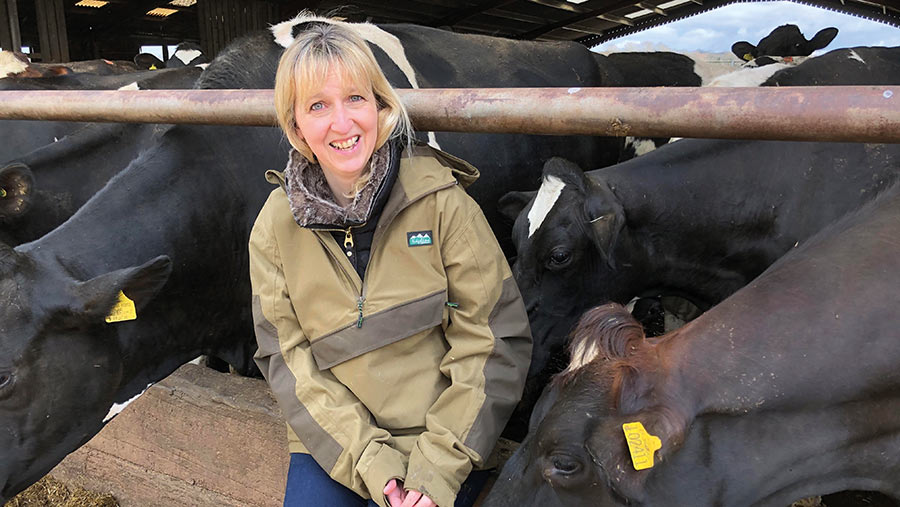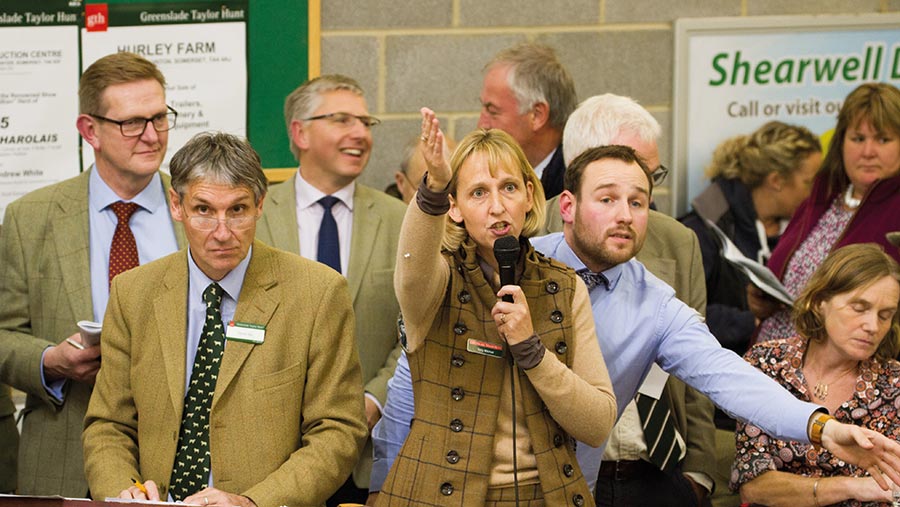Leading livestock auctioneer shares her career highlights
 Sally Mitchell © Sally Mitchell
Sally Mitchell © Sally Mitchell Sally Mitchell of Greenslade Taylor Hunt became the firm’s first female agricultural partner in 2016.
Her role is split between selling dairy and suckler cows and professional services work, such as farm valuations and compensation claims.
“It’s hugely varied. If you love the countryside, want to live where you work and have a passion for livestock, there’s no better job than this,” says Sally.
See also: Job profile – what it’s like to be an agricultural solicitor
One of the highlights of her 26 years with the West Country property and auction company was the dispersal of the Balbithan Charolais herd at Sedgemoor Auction Centre, not least because the herd manager, the late Jane Haw, was a close family friend.
The sale saw prices rise to 17,500gns for Balbithan Faith with her six-month-old bull calf at foot – a figure that still stands as the Centre’s record price.
“Every time I stand in a rostrum, I still get nervous,” says Sally. “But the nerves aren’t so much from standing in front of people, they’re more from the responsibility.
“When you’re conducting a dispersal sale, particularly, you’re dealing with someone’s livelihood and are very conscious you’re selling stock that people have invested a huge amount of time, effort and money in – perhaps a whole lifetime’s.
“They’re trusting you and you only get to do it once, so you have to get it right.”
Career route
In many ways, she says, she fell into the job by accident after graduating from Reading University in 1994 with a degree in rural resource management.
“It was a course that was ahead of its time because it’s very relevant now, but at the time, it didn’t really give me an obvious career-route profession.”

Having grown up on a family farm, however, she knew she wanted to forge a career connected in some way to agriculture, so joined the then-firm of RB Taylor as a farm sales clerk, typically involved in three sales a week and travelling all over the South West.
“I never thought I’d be an auctioneer – it wasn’t something I grew up wanting to be.
“My family has always been very cattle orientated and it’s also been a lifelong passion of mine. For many years, the family had dairy cows, although we later began concentrating on our Lanscombe pedigree Hereford herd and livestock haulage business.”
Having fallen in love with the profession, she qualified as a rural practice chartered surveyor, via a distance learning course with the College of Estate Management at Reading.
Experiences in the job
Life as an auctioneer and agricultural surveyor can involve long days and hard work, but Sally highly recommends it. When you’re selling stock and have a good trade, there’s nothing like it. The buzz is incredible.
“There were very few female auctioneers when I joined, but it’s not a profession that discourages women from entering it.
“To progress in any job, there is an element of being in the right place at the right time and I’ve been fortunate to have had the opportunities and support I have.
“I was also really fortunate to have parents who, when I said I wanted to do something, never said ‘you can’t because you’re a girl’, but who always said ‘well get on with it then!’”
“Now, as back then, senior people in the sector have a responsibility to encourage youngsters to come into this profession.
“We need new blood and new ideas. Auctioneering has changed tremendously in the past 25 years, not least because of all the new technology.
“Of course, there have been some tough times. I ended up doing valuations for herds that were destroyed after the foot-and-mouth outbreak in 2001, which was something I never thought – or hoped – I’d have to do.
“It was horrific. I don’t think the general public ever understood how devastating it was for the families caught up in it. A lot of those dairy cows were simply irreplaceable.
“TB today is awful and, in some respects, even worse that foot-and-mouth was, because you can’t deal with it and move on.
“During foot-and-mouth, the initial hit was horrific – and you had no control over it – but people at least could then regroup and re-establish.”
Skills
Would-be auctioneers need to have a belief in what they’re selling and a certain amount of confidence in themselves, but they don’t need to be a larger-than-life personality, she stresses.
“What’s important is that you can relate to people from all walks of life. You also have to know about what you’re selling and you’ve definitely got to enjoy the banter!”
Although lots of smaller markets have closed in recent years, Sally is as much of a believer as ever in the principle of the live auction.
Future of live auctions
“There’s been talk about their future for as long as I can remember, but you need markets to establish in a transparent way what something is worth.”
Auctions, meanwhile, have changed tremendously over the years. Sedgemoor, for example, opened its doors in 2008, with facilities geared towards high standards of animal welfare – and there’s even a health centre for those who visit the Somerset mart.
“Farmers are not great at going to see a doctor if they have a problem, so the theory is if that facility is on hand when they were in the market, they’ll be more inclined to use it.”
She also stresses the vital role marts play as a meeting place, giving farmers who may live largely isolated lives an opportunity for face-to-face interaction.

